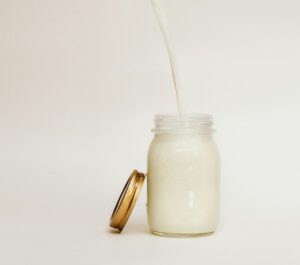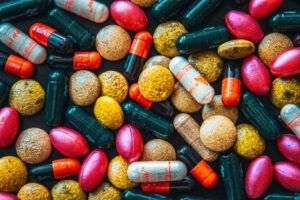 While there are some health conditions that are exacerbated by consuming too much protein, a diet without protein can have health risks for most people. You need protein in your diet. It’s an essential macronutrient that is necessary for building bones, muscle, and skin. It’s necessary for the body to create hormones and enzymes and make repairs to tissue. Too little protein can cause a lowered immune response, loss of muscle tissue, reduced bone density, damaged nails and hair loss and even a propensity to overeat, since protein is filling.
While there are some health conditions that are exacerbated by consuming too much protein, a diet without protein can have health risks for most people. You need protein in your diet. It’s an essential macronutrient that is necessary for building bones, muscle, and skin. It’s necessary for the body to create hormones and enzymes and make repairs to tissue. Too little protein can cause a lowered immune response, loss of muscle tissue, reduced bone density, damaged nails and hair loss and even a propensity to overeat, since protein is filling.
Some people require a diet lower in protein because of health conditions.
There are people who benefit from a diet lower in protein, but there is no benefit from a diet absent in protein. People with liver or kidney disease, homocystinuria and phenylketonuria get help with a lower protein diet. That’s because when the body breaks down protein down during digestion, excess protein is handled by the liver and leaves a waste product called urea. The kidneys then have to excrete the urea. Keeping the diet lower in protein can help prevent this from occurring and lower the work load of both organs. Otherwise, they develop a higher amount of urea in the blood, which causes symptoms like weight loss, fatigue, loss of appetite and even mental changes. It also can increase the potential for Type 2 diabetes, heart failure and some forms of cancer.
It’s hard enough to create a low protein diet that’s healthy, but impossible to go without any protein and still be healthy.
Because protein is a macronutrient and foods containing it, also contain other nutrients necessary to a healthy body, trying to create a diet low in protein that’s healthy is tough and not recommended for most healthy people. It can also be challenging reducing protein intake and requires careful planning to meet your nutritional needs. There are many higher protein foods that contain key nutrients you need to live. Animal products, such as beef, are high in iron, zinc and many B vitamins. Plant proteins, such as beans, contain many minerals like magnesium, potassium and phosphorus, for example. That makes it far more complicated to create and follow and should only be undertaken with supervision of your health care professional.
What types of food would a low protein diet contain.
A no protein diet should never be considered. Even people with medical issues that involve protein need to have some protein in their diet. Why? Because it’s necessary for the body to function and to achieve that, will get the protein from the body itself. It breaks down muscle tissue to do that, including the heart muscle. If you’re considering cutting back on protein, foods low in protein include fruits, vegetables, grains and healthy fats such as avocados, coconut oil and olive oil.
- A lower protein diet uses higher protein foods as a side dish and limits their intake. Since protein is higher in calories and helps fill you up, increasing calories from fat may be necessary to accomplish those things.
- While some studies show that people on a lower protein diet live longer, other studies show negative effects of this type of diet. For instance, one study showed that increasing protein in the diet lowered blood pressure after four years than those with less protein intake.
- The body needs protein to maintain the balance between water and salt in the blood vessels, which prevents fluid from filling tissues. When protein levels are lower, swelling of the legs and edema are more likely to occur.
- Losing weight is all about getting healthier and fad diets or diets that cut out an important macronutrients are not the way to go. 180° Fitness, we can help you learn how to make healthier choices and attain your perfect, healthy way.
For more information, contact us today at 180 Fitness




